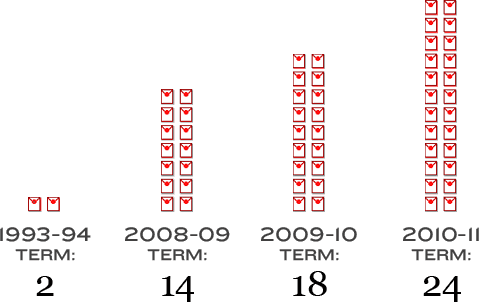A federal judge ruled in favor of reporter James Risen, who invoked his First Amendment rights to protect a confidential source. The Reporters Committee for Freedom of the Press and other groups called the ruling an important victory for the press. The Department of Justice, which appealed the decision, continued to take an aggressive approach in filing criminal charges against people who leak classified information. U.S. journalist groups were also troubled that increasing numbers of case documents were being sealed by the Supreme Court. CPJ reported that the State Department fell short in its first year of implementing the Daniel Pearl Freedom of the Press Act, which requires that press freedom issues be incorporated into the agency’s annual country reports on human rights. WikiLeaks was in the headlines again when it disclosed thousands of classified, unredacted U.S. diplomatic cables. An Ethiopian journalist was forced to flee his country after he was cited in a cable. Police in five cities arrested reporters and photographers covering Occupy Wall Street demonstrations, often claiming the journalists did not have sufficient accreditation. At least three other journalists covering Occupy events were attacked by protesters or police officers.
United States
» Two convicted for orchestrating 2007 murder of editor Chauncey Bailey.
» Government secrecy troubles U.S. journalism groups.
A federal judge ruled in favor of reporter James Risen, who invoked his First Amendment rights to protect a confidential source. The Reporters Committee for Freedom of the Press and other groups called the ruling an important victory for the press. The Department of Justice, which appealed the decision, continued to take an aggressive approach in filing criminal charges against people who leak classified information. U.S. journalist groups were also troubled that increasing numbers of case documents were being sealed by the Supreme Court. CPJ reported that the State Department fell short in its first year of implementing the Daniel Pearl Freedom of the Press Act, which requires that press freedom issues be incorporated into the agency’s annual country reports on human rights. WikiLeaks was in the headlines again when it disclosed thousands of classified, unredacted U.S. diplomatic cables. An Ethiopian journalist was forced to flee his country after he was cited in a cable. Police in five cities arrested reporters and photographers covering Occupy Wall Street demonstrations, often claiming the journalists did not have sufficient accreditation. At least three other journalists covering Occupy events were attacked by protesters or police officers.
-
24
Supreme Court sealed records, 2010-11 -
2
Convictions, Bailey murder -
0
Detained by U.S. abroad -
1
Targeted after U.S. cable leak -
20
Attacks, arrests at Occupy protests
The Supreme Court has sealed an increasing number of records and documents in recent years, according to the Reporters Committee for Freedom of the Press.

Two men were convicted in June on charges of orchestrating the 2007 murder of editor Chauncey Bailey in Oakland. Yusuf Bey IV, found guilty of ordering the murder, and accomplice Antoine Mackey were later sentenced to life in prison. The gunman, who pleaded guilty in 2009, is serving a 25-year sentence.
This was the first full calendar year since 2003 in which no journalist was held in U.S. custody abroad, CPJ research shows. Beginning in 2004, U.S. military forces held numerous journalists in Iraq, Afghanistan, and Guantánamo Bay on vague assertions that they posed security threats. They were all held without charge or due process.
Imprisoned by U.S. forces abroad, as documented on CPJ's annual December 1 surveys:
2005: 5
2006: 2
2007: 2
2008: 1
2009: 1
2010: 0 (A detainee was released in February 2010)
2011: 0
Ethiopian journalist Argaw Ashine was forced to flee his country after WikiLeaks disclosed a U.S. diplomatic cable in which his name appeared. Ethiopian police interrogated Ashine when the cable disclosed that he had told U.S. diplomats about a potential press crackdown.
2
Requests made by CPJ to WikiLeaks in 2010 to redact names of journalists cited in cables. WikiLeaks promptly complied.251,287
Number of unredacted U.S. diplomatic cables that became available in September.As police nationwide rounded up protesters demonstrating in allegedly unauthorized places, they also detained journalists covering the events. Press accreditation was at the center of several cases as police refused to acknowledge journalists who did not carry what they considered to be official accreditation. Assaults were also reported, including an attack in Oakland that left a cameraman with a concussion.
17: Arrests. Police arrested journalists in New York, Oakland, Nashville, Richmond, and Milwaukee.
1: Attack by police. In New York, a Fox 5 crew was hit by pepper spray and police batons as protesters broke past barriers and police sought to contain them.
2: Attacks by protesters. In Oakland, several men assaulted KGO cameraman Randy Davis as he was trying to film the aftermath of a fatal shooting at a protest site. In New York, a demonstrator seized a reporter's microphone.
